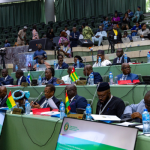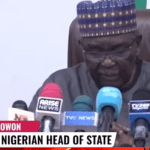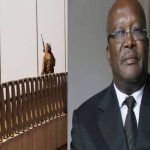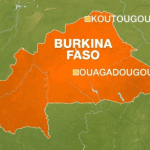Mali, Burkina Faso and Niger have signed a mutual defence pact, as the three Sahel countries aim to help each other against possible threats of armed rebellion or external aggression.
The charter, known as the Alliance of Sahel States, signed on Saturday binds the signatories to assist one another – including militarily – in the event of an attack on any one of them.
The Liptako-Gourma region – where the Mali, Burkina Faso and Niger borders meet – has been ravaged by armed rebellion in recent years.
An armed rebellion that erupted in northern Mali in 2012 spread to Niger and Burkina Faso in 2015.
All three states were members of the France-supported G5 Sahel alliance joint force with Chad and Mauritania, launched in 2017 to tackle armed groups linked to al-Qaeda and ISIL (ISIS) groups.
They have undergone coups since 2020, most recently Niger, where soldiers in July overthrew President Mohamed Bazoum, who cooperated with the West in the fight against Sahel-based armed groups.
The West African regional bloc ECOWAS has threatened to intervene militarily in Niger over the coup, but the regional bloc has toned down its war rhetoric in recent weeks.
Mali and Burkina Faso quickly responded by saying that any such operation would be deemed a “declaration of war” against them.
Relations between France and the three states have soured since the coups.
France has been forced to withdraw its troops from Mali and Burkina Faso, and is in a tense standoff with the military that seized power in Niger. Mali has also asked the UN peacekeeping mission MINUSMA to leave the country.
Niger’s military rulers have asked France to withdraw its troops and its ambassador, as France has refused to recognise the new military authority.
Meanwhile, Mali has seen a resumption of hostilities by predominantly Tuareg armed groups over the past week, threatening a 2015 peace agreement.
Mali, Burkina Faso and Niger have signed a mutual defence pact, as the three Sahel countries aim to help each other against possible threats of armed rebellion or external aggression.
The charter, known as the Alliance of Sahel States, signed on Saturday binds the signatories to assist one another – including militarily – in the event of an attack on any one of them.
The Liptako-Gourma region – where the Mali, Burkina Faso and Niger borders meet – has been ravaged by armed rebellion in recent years.
An armed rebellion that erupted in northern Mali in 2012 spread to Niger and Burkina Faso in 2015.
All three states were members of the France-supported G5 Sahel alliance joint force with Chad and Mauritania, launched in 2017 to tackle armed groups linked to al-Qaeda and ISIL (ISIS) groups.
They have undergone coups since 2020, most recently Niger, where soldiers in July overthrew President Mohamed Bazoum, who cooperated with the West in the fight against Sahel-based armed groups.
The West African regional bloc ECOWAS has threatened to intervene militarily in Niger over the coup, but the regional bloc has toned down its war rhetoric in recent weeks.
Mali and Burkina Faso quickly responded by saying that any such operation would be deemed a “declaration of war” against them.
Relations between France and the three states have soured since the coups.
France has been forced to withdraw its troops from Mali and Burkina Faso, and is in a tense standoff with the military that seized power in Niger. Mali has also asked the UN peacekeeping mission MINUSMA to leave the country.
Niger’s military rulers have asked France to withdraw its troops and its ambassador, as France has refused to recognise the new military authority.
Meanwhile, Mali has seen a resumption of hostilities by predominantly Tuareg armed groups over the past week, threatening a 2015 peace agreement.
Mali, Burkina Faso and Niger have signed a mutual defence pact, as the three Sahel countries aim to help each other against possible threats of armed rebellion or external aggression.
The charter, known as the Alliance of Sahel States, signed on Saturday binds the signatories to assist one another – including militarily – in the event of an attack on any one of them.
The Liptako-Gourma region – where the Mali, Burkina Faso and Niger borders meet – has been ravaged by armed rebellion in recent years.
An armed rebellion that erupted in northern Mali in 2012 spread to Niger and Burkina Faso in 2015.
All three states were members of the France-supported G5 Sahel alliance joint force with Chad and Mauritania, launched in 2017 to tackle armed groups linked to al-Qaeda and ISIL (ISIS) groups.
They have undergone coups since 2020, most recently Niger, where soldiers in July overthrew President Mohamed Bazoum, who cooperated with the West in the fight against Sahel-based armed groups.
The West African regional bloc ECOWAS has threatened to intervene militarily in Niger over the coup, but the regional bloc has toned down its war rhetoric in recent weeks.
Mali and Burkina Faso quickly responded by saying that any such operation would be deemed a “declaration of war” against them.
Relations between France and the three states have soured since the coups.
France has been forced to withdraw its troops from Mali and Burkina Faso, and is in a tense standoff with the military that seized power in Niger. Mali has also asked the UN peacekeeping mission MINUSMA to leave the country.
Niger’s military rulers have asked France to withdraw its troops and its ambassador, as France has refused to recognise the new military authority.
Meanwhile, Mali has seen a resumption of hostilities by predominantly Tuareg armed groups over the past week, threatening a 2015 peace agreement.
Mali, Burkina Faso and Niger have signed a mutual defence pact, as the three Sahel countries aim to help each other against possible threats of armed rebellion or external aggression.
The charter, known as the Alliance of Sahel States, signed on Saturday binds the signatories to assist one another – including militarily – in the event of an attack on any one of them.
The Liptako-Gourma region – where the Mali, Burkina Faso and Niger borders meet – has been ravaged by armed rebellion in recent years.
An armed rebellion that erupted in northern Mali in 2012 spread to Niger and Burkina Faso in 2015.
All three states were members of the France-supported G5 Sahel alliance joint force with Chad and Mauritania, launched in 2017 to tackle armed groups linked to al-Qaeda and ISIL (ISIS) groups.
They have undergone coups since 2020, most recently Niger, where soldiers in July overthrew President Mohamed Bazoum, who cooperated with the West in the fight against Sahel-based armed groups.
The West African regional bloc ECOWAS has threatened to intervene militarily in Niger over the coup, but the regional bloc has toned down its war rhetoric in recent weeks.
Mali and Burkina Faso quickly responded by saying that any such operation would be deemed a “declaration of war” against them.
Relations between France and the three states have soured since the coups.
France has been forced to withdraw its troops from Mali and Burkina Faso, and is in a tense standoff with the military that seized power in Niger. Mali has also asked the UN peacekeeping mission MINUSMA to leave the country.
Niger’s military rulers have asked France to withdraw its troops and its ambassador, as France has refused to recognise the new military authority.
Meanwhile, Mali has seen a resumption of hostilities by predominantly Tuareg armed groups over the past week, threatening a 2015 peace agreement.
Mali, Burkina Faso and Niger have signed a mutual defence pact, as the three Sahel countries aim to help each other against possible threats of armed rebellion or external aggression.
The charter, known as the Alliance of Sahel States, signed on Saturday binds the signatories to assist one another – including militarily – in the event of an attack on any one of them.
The Liptako-Gourma region – where the Mali, Burkina Faso and Niger borders meet – has been ravaged by armed rebellion in recent years.
An armed rebellion that erupted in northern Mali in 2012 spread to Niger and Burkina Faso in 2015.
All three states were members of the France-supported G5 Sahel alliance joint force with Chad and Mauritania, launched in 2017 to tackle armed groups linked to al-Qaeda and ISIL (ISIS) groups.
They have undergone coups since 2020, most recently Niger, where soldiers in July overthrew President Mohamed Bazoum, who cooperated with the West in the fight against Sahel-based armed groups.
The West African regional bloc ECOWAS has threatened to intervene militarily in Niger over the coup, but the regional bloc has toned down its war rhetoric in recent weeks.
Mali and Burkina Faso quickly responded by saying that any such operation would be deemed a “declaration of war” against them.
Relations between France and the three states have soured since the coups.
France has been forced to withdraw its troops from Mali and Burkina Faso, and is in a tense standoff with the military that seized power in Niger. Mali has also asked the UN peacekeeping mission MINUSMA to leave the country.
Niger’s military rulers have asked France to withdraw its troops and its ambassador, as France has refused to recognise the new military authority.
Meanwhile, Mali has seen a resumption of hostilities by predominantly Tuareg armed groups over the past week, threatening a 2015 peace agreement.
Mali, Burkina Faso and Niger have signed a mutual defence pact, as the three Sahel countries aim to help each other against possible threats of armed rebellion or external aggression.
The charter, known as the Alliance of Sahel States, signed on Saturday binds the signatories to assist one another – including militarily – in the event of an attack on any one of them.
The Liptako-Gourma region – where the Mali, Burkina Faso and Niger borders meet – has been ravaged by armed rebellion in recent years.
An armed rebellion that erupted in northern Mali in 2012 spread to Niger and Burkina Faso in 2015.
All three states were members of the France-supported G5 Sahel alliance joint force with Chad and Mauritania, launched in 2017 to tackle armed groups linked to al-Qaeda and ISIL (ISIS) groups.
They have undergone coups since 2020, most recently Niger, where soldiers in July overthrew President Mohamed Bazoum, who cooperated with the West in the fight against Sahel-based armed groups.
The West African regional bloc ECOWAS has threatened to intervene militarily in Niger over the coup, but the regional bloc has toned down its war rhetoric in recent weeks.
Mali and Burkina Faso quickly responded by saying that any such operation would be deemed a “declaration of war” against them.
Relations between France and the three states have soured since the coups.
France has been forced to withdraw its troops from Mali and Burkina Faso, and is in a tense standoff with the military that seized power in Niger. Mali has also asked the UN peacekeeping mission MINUSMA to leave the country.
Niger’s military rulers have asked France to withdraw its troops and its ambassador, as France has refused to recognise the new military authority.
Meanwhile, Mali has seen a resumption of hostilities by predominantly Tuareg armed groups over the past week, threatening a 2015 peace agreement.
Mali, Burkina Faso and Niger have signed a mutual defence pact, as the three Sahel countries aim to help each other against possible threats of armed rebellion or external aggression.
The charter, known as the Alliance of Sahel States, signed on Saturday binds the signatories to assist one another – including militarily – in the event of an attack on any one of them.
The Liptako-Gourma region – where the Mali, Burkina Faso and Niger borders meet – has been ravaged by armed rebellion in recent years.
An armed rebellion that erupted in northern Mali in 2012 spread to Niger and Burkina Faso in 2015.
All three states were members of the France-supported G5 Sahel alliance joint force with Chad and Mauritania, launched in 2017 to tackle armed groups linked to al-Qaeda and ISIL (ISIS) groups.
They have undergone coups since 2020, most recently Niger, where soldiers in July overthrew President Mohamed Bazoum, who cooperated with the West in the fight against Sahel-based armed groups.
The West African regional bloc ECOWAS has threatened to intervene militarily in Niger over the coup, but the regional bloc has toned down its war rhetoric in recent weeks.
Mali and Burkina Faso quickly responded by saying that any such operation would be deemed a “declaration of war” against them.
Relations between France and the three states have soured since the coups.
France has been forced to withdraw its troops from Mali and Burkina Faso, and is in a tense standoff with the military that seized power in Niger. Mali has also asked the UN peacekeeping mission MINUSMA to leave the country.
Niger’s military rulers have asked France to withdraw its troops and its ambassador, as France has refused to recognise the new military authority.
Meanwhile, Mali has seen a resumption of hostilities by predominantly Tuareg armed groups over the past week, threatening a 2015 peace agreement.
Mali, Burkina Faso and Niger have signed a mutual defence pact, as the three Sahel countries aim to help each other against possible threats of armed rebellion or external aggression.
The charter, known as the Alliance of Sahel States, signed on Saturday binds the signatories to assist one another – including militarily – in the event of an attack on any one of them.
The Liptako-Gourma region – where the Mali, Burkina Faso and Niger borders meet – has been ravaged by armed rebellion in recent years.
An armed rebellion that erupted in northern Mali in 2012 spread to Niger and Burkina Faso in 2015.
All three states were members of the France-supported G5 Sahel alliance joint force with Chad and Mauritania, launched in 2017 to tackle armed groups linked to al-Qaeda and ISIL (ISIS) groups.
They have undergone coups since 2020, most recently Niger, where soldiers in July overthrew President Mohamed Bazoum, who cooperated with the West in the fight against Sahel-based armed groups.
The West African regional bloc ECOWAS has threatened to intervene militarily in Niger over the coup, but the regional bloc has toned down its war rhetoric in recent weeks.
Mali and Burkina Faso quickly responded by saying that any such operation would be deemed a “declaration of war” against them.
Relations between France and the three states have soured since the coups.
France has been forced to withdraw its troops from Mali and Burkina Faso, and is in a tense standoff with the military that seized power in Niger. Mali has also asked the UN peacekeeping mission MINUSMA to leave the country.
Niger’s military rulers have asked France to withdraw its troops and its ambassador, as France has refused to recognise the new military authority.
Meanwhile, Mali has seen a resumption of hostilities by predominantly Tuareg armed groups over the past week, threatening a 2015 peace agreement.














